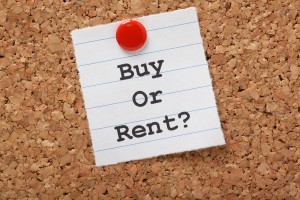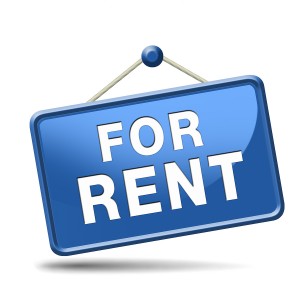Renting vs. Buying: What’s Really Cheaper?
To buy, or not to buy?
 It’s a question most families will grapple with at some point in their lives, and there isn’t a one-size-fits-all answer.
It’s a question most families will grapple with at some point in their lives, and there isn’t a one-size-fits-all answer.
Traditional wisdom has supported buying over renting as the most cost-effective living situation, and in many cases, it is. But not always.
Whether you’re a proponent of renting or a fierce fan of buying, you probably know it’s a mistake to simply compare the cost of a month’s rent to the cost of a monthly mortgage payment. It’s not a fair, “apples to apples” comparison, yet I still hear people doing it all the time.
Below are some pros and cons of both options that take more than just monthly costs into consideration. I tried to keep things even, with five benefits of renting and five benefits of buying. Which side of the fence you choose will depend on your individual needs and lifestyle.
If you’re still undecided, check out one of the buying vs. renting calculators at the bottom of this post. And, as always, prayer and wise counsel from godly friends should always trump the calculator.
Reasons to Rent
1. Flexibility
Whether you’re thinking about switching jobs, expanding your family or you’re just not sure where you want to “settle down,” the flexibility that comes with most rental properties is a huge plus.
In most cases, you can move out and skip town with 60 days’ notice or less, and there are usually month-to-month options if life is particularly uncertain.
2. Convenience
If time is money, renting can save you a bundle.
With many rentals, you’re not worrying about landscaping, mowing the lawn and tinkering with broken appliances. That’s the landlord’s problem. You also save time by avoiding the complex, sometimes stressful and often drawn-out process of home buying.

3. Cost
This is about more than just the price of rent. If you take closing costs, property taxes, homeowners insurance and pricey home repairs into consideration, renting can start to look pretty attractive.
4. Peace of Mind
Sour housing market? Not your problem. Foreclosures on the rise? No worries. As a renter, you aren’t building equity, but you aren’t worrying about losing it, either.
Especially during unstable economic times, renting can be a great option for those who aren’t quite ready to take the homeownership plunge.
5. Simplicity (probably)
It seems the more space we have, the more stuff we collect to fill it. I was recently talking to a new homeowner who was lamenting the dilemma of having “apartment furniture” in a space that needed “house furniture.” Only in America.
While the problem may seem ridiculous, it’s true that home ownership often leads to all kinds of extra purchases. New furniture, window treatments, gardening supplies, paint. The list goes on and on. In many cases, people behave more frugally (and less like hoarders) when they’re living the apartment life.
Reasons to Buy
1. Equity
You know that home-owning relative who just loves to talk about how renting is the equivalent of “flushing money down the toilet”? Well, in many cases, he’s right.
When the lease is up on your rental and you move on, you won’t have anything to show for the months or years you spent there (unless you socked away a huge chunk of money for a down payment). If you buy a home, you’ll build equity as your house will likely increase in value over time.
2. Control
There are few things worse than a terrible landlord. While there are a lot of great property owners out there, there are also plenty of horror stories about landlords who fail to pay the utility bills or refuse to fix major problems.
By owning your own home, you get to call the shots. In addition to having control over the essentials, you also have the freedom to paint, decorate and remodel as you choose, because you’re in charge.
3. Consistency
The option of having a fixed interest rate means you can count on a consistent mortgage payment month after month and year after year.
Not so with rentals.
I’ve seen rental companies raise their prices by several hundred dollars a month when the lease is up, forcing tenants to fork over way too much money or quickly find another place to live. You don’t see that happening with a low interest, fixed-rate mortgage.
4. Cost
Even though the economy is bouncing back from the recession, a lot of people are still nervous about buying a home. That means more demand for rental properties and, in turn, higher rent prices. Home values are also rising, but that’s a benefit in the long run as equity is built.
5. Community
Neighborhoods with lots of rental properties tend to be in constant flux. New neighbors are moving in and out all the time, and it can be difficult to get to know people. In residential areas full of homeowners, neighbors tend to know who’s who, and it’s easier to foster a sense of community.
I was originally going to say that this particular consideration is not a financial one, but perhaps it is. Think about it: what’s the value of having a great, long-term neighbor? I’m talking about someone who voluntarily keeps an eye on your house when you’re gone, takes the dog out occasionally and even runs over to watch the kids when an emergency pops up. I’m not sure exactly how much that’s worth in dollars, but I’d say a good neighbor is priceless.
If you still need a little help with the renting vs. buying question, check out these free online calculators.
